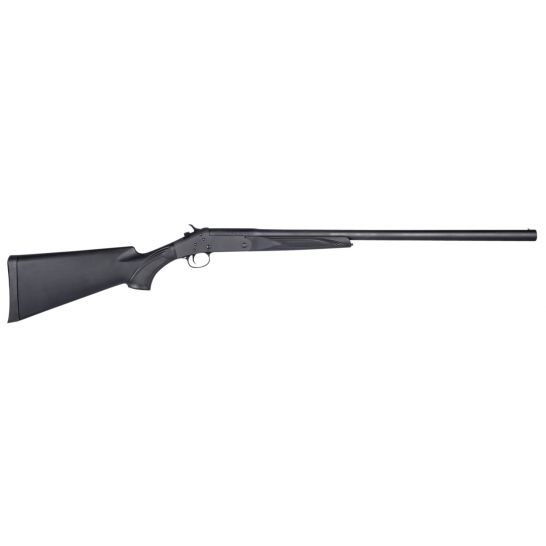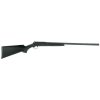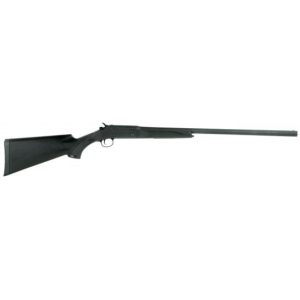Savage Arms Stevens 301 Single Shot 410 Gauge Break Open-Action Shotgun, Matte Black – 19201 For Sale
$175.99
The Savage Arms Stevens 301 Single Shot 410 Gauge Break Open-Action Shotgun is an ideal choice for hunters seeking simplicity and reliability. This shotgun merges traditional design with modern improvements, offering outstanding field performance. It features a durable synthetic stock built for tough conditions and a soft recoil pad for comfort during prolonged use. The modified choke enhances versatility across various hunting scenarios, while the forearm release allows for easy disassembly and maintenance. Additionally, the hammer blocking safety adds an extra layer of security. Its crisp break-action appeals to those who value straightforward firearm reliability, making it a dependable partner for practical hunters. The matte black finish adds a sleek, tactical look to this robust and functional weapon.
What is Stevens 301?
The Stevens 301 is a single-shot shotgun manufactured by Stevens, a brand under Savage Arms. It’s typically known for being affordable and simple, making it a popular choice for beginners and hunters looking for a reliable and straightforward firearm. The shotgun is available in various gauges and configurations, and it often features a durable synthetic stock.
What was a single-shot 12 gauge used for?
A single-shot 12 gauge shotgun is primarily used for hunting, sport shooting, and sometimes for home defense. Its simplicity, reliability, and ease of use make it a popular choice for beginners and experienced shooters alike. It is commonly used to hunt small game and birds, and can also be used for target practice or clay pigeon shooting.
What are the benefits of a single-shot shotgun?
Single-shot shotguns offer several benefits, including:
1. **Simplicity and Reliability**: With fewer moving parts compared to other types of shotguns, single-shot shotguns are less likely to malfunction and are easier to maintain and clean.
2. **Affordability**: Generally, single-shot shotguns are less expensive than other types of shotguns, making them a cost-effective choice for beginners or those on a budget.
3. **Safety**: Their design requires manual reloading after each shot, which can encourage more deliberate shooting and enhance safety, especially for new shooters.
4. **Lightweight and Easy Handling**: Lacking the additional components of multi-shot firearms, single-shot shotguns are often lighter, making them easier to carry in the field.
5. **Improved Shooting Skills**: The need to reload after every shot encourages shooters to focus on accuracy and taking well-aimed shots, potentially improving marksmanship.
6. **Legal in Multiple Jurisdictions**: In some areas with stricter gun control laws, single-shot shotguns may be subject to fewer regulations, making them more accessible.
7. **Versatility**: These shotguns can be used for a variety of applications, including hunting, target shooting, and training purposes.
What is the best single-shot shotgun?
The best single-shot shotgun often depends on personal preferences, intended use, and specific requirements. However, as of the latest reviews and expert opinions, the Henry Single Shot Shotgun is frequently regarded as an excellent choice due to its craftsmanship, reliability, and versatility. It’s well-suited for hunting and target shooting. Always consider factors like barrel length, gauge, weight, and price when choosing the right shotgun for your needs.
Where is Stevens 301 made?
The Stevens 301 shotgun is manufactured in China.
When did they stop making Stevens shotguns?
Stevens shotguns, produced by the Stevens Arms Company which later became part of Savage Arms, have not ceased production entirely. The Stevens brand continues to produce shotguns, including popular models such as the Stevens 320 and Stevens 555. If you are referring to a specific model or era, please provide more details for a precise answer.
What is 12-gauge 1 shot used for?
A 12-gauge 1 shot shell is commonly used in hunting and shooting sports. Specifically, it is often employed for hunting medium to large game birds, such as ducks, geese, and turkeys. The size of the shot, typically referred to as “number 1 shot,” includes pellets that are large enough to effectively bring down these birds while still offering a reasonable spread pattern. Additionally, it may be used for certain types of clay target shooting and, in some instances, for home defense.
Why own a single shot shotgun?
Owning a single shot shotgun can be appealing for several reasons:
1. **Simplicity and Reliability**: Single shot shotguns are mechanically simple, which makes them highly reliable and easy to maintain. Fewer moving parts mean there’s less that can go wrong.
2. **Cost**: These shotguns are often more affordable than their multi-shot counterparts, making them an attractive option for budget-conscious buyers or beginners.
3. **Safety and Training**: With only one shot available before reloading, single shot shotguns encourage deliberate shooting and can be a good tool for teaching firearm safety and aiming skills.
4. **Lightweight and Easy to Handle**: Typically lighter and easier to manage, a single shot shotgun can be ideal for individuals who prefer a firearm that’s simple to carry and operate.
5. **Hunting**: For certain types of hunting, a single shot shotgun is sufficient, and the challenge of making a precise shot can be part of the appeal.
6. **Legal Restrictions**: In some jurisdictions, there may be fewer legal restrictions on owning single shot shotguns compared to other types of firearms.
7. **Aesthetic and Historical Value**: Some people appreciate single shot shotguns for their classic design and craftsmanship, making them valuable as collectibles or heirloom pieces.
Overall, these shotguns offer a combination of practicality, affordability, and simplicity that can be attractive to a wide range of firearm enthusiasts.
Why a single shot rifle?
A single shot rifle can offer several advantages:
1. **Simplicity**: It has a straightforward design with fewer moving parts, making it easier to maintain and reliable.
2. **Safety**: With only one round loaded at a time, there’s a reduced risk of accidental discharge of additional rounds.
3. **Discipline**: It encourages shooters to carefully aim and make each shot count, fostering improved marksmanship.
4. **Lightweight**: Typically lighter than multi-shot rifles, it’s easier to carry during long hunting trips or outings.
5. **Challenge**: Some hunters and sports shooters enjoy the added challenge and skill involved in using a single shot.
6. **Legal Regulations**: In certain hunting or shooting competitions, single-shot rifles may be required or preferred due to local rules and standards.
Overall, a single shot rifle is chosen for its reliability, simplicity, and the skill it requires to use effectively.
Can you hunt with a single-shot shotgun?
Yes, you can hunt with a single-shot shotgun. Single-shot shotguns are capable of taking down game, but they require the hunter to be accurate and efficient, as you’ll need to reload after each shot. They are often used for hunting small game and birds.
Is a single-shot shotgun good for self defense?
A single-shot shotgun can be used for self-defense, but it has some limitations compared to other firearms that might be better suited for this purpose. Here are some considerations:
1. **Simplicity and Reliability**: Single-shot shotguns are generally simple, which can make them very reliable. They have fewer moving parts and are less likely to jam or malfunction.
2. **Stopping Power**: Shotguns, in general, are known for their stopping power. Even with just one shot, a shotgun can be very effective in stopping a threat.
3. **Limited Capacity**: The main disadvantage is the single-shot capacity, which requires reloading after each shot. This could be a significant drawback in a self-defense situation where multiple shots might be necessary.
4. **Reload Time**: The need to reload after every shot can be a critical disadvantage in a high-pressure situation.
5. **Training and Practice**: Like any firearm, effectiveness comes with proper training and practice. It’s important for the user to be proficient in reloading and using the shotgun under stress.
Overall, while a single-shot shotgun can be used for self-defense, other options such as pump-action or semi-automatic shotguns might offer more advantages, particularly due to their higher capacity and quicker follow-up shot ability. Ultimately, the best choice depends on the user’s comfort, skill level, and specific self-defense needs.
What are the cons of a shotgun?
**The cons of a shotgun are as follows:**
1. **Limited Range and Accuracy:** Shotguns are generally less accurate than rifles at longer distances due to their wider shot spread, making them less suitable for long-range shooting.
2. **Recoil:** Many shotguns have significant recoil, which can be difficult to manage, especially for beginners or those of smaller stature.
3. **Capacity:** Shotguns often have a lower ammunition capacity compared to rifles or handguns, which can be a limitation in certain situations.
4. **Bulk and Weight:** Shotguns tend to be bulkier and heavier, which can make them less maneuverable and more tiring to carry for extended periods.
5. **Reloading Time:** Reloading a shotgun can take more time compared to magazine-fed firearms, potentially leaving the user vulnerable in high-stress situations.
6. **Ammunition Weight and Size:** Shotgun shells are larger and heavier than rifle or handgun ammunition, affecting how much ammunition can be carried comfortably.
7. **Overpenetration Risk:** At closer ranges, the spread of shot can cause unintended damage to nearby objects or people, making shotguns less ideal for use in populated or urban areas.
8. **Maintenance:** Shotguns require regular cleaning and maintenance, particularly if exposed to harsh conditions, to maintain reliability and performance.
9. **Noise Level:** Shotguns are louder than many other firearms, which can be disorienting or require additional hearing protection.
10. **Specialized Use:** Shotguns are highly effective for specific purposes like hunting or sport shooting but may not be the best choice for all tactical scenarios.
What is the 301 area code?
The 301 area code is a telephone area code in the North American Numbering Plan for parts of the state of Maryland in the United States. It serves the western portion of Maryland, including cities such as Bethesda, Gaithersburg, Frederick, Hagerstown, and Rockville.
What is the Stevens 320 a clone of?
The Stevens 320 is a clone of the Winchester Model 1300 shotgun.
What size barrel is a Stevens 301 12 gauge?
The Stevens 301 12 gauge typically comes with a barrel length of 26 inches.
| Product Line | Stevens 301 Single Shot |
|---|---|
| Action | Break Open |
| Magazine Type | Single Shot |
| Stock | Sporter |
| Sights | Bead |
| Barrel Material | Carbon Steel |
| Receiver Material | Carbon Steel |
| Stock Material | Synthetic |
| Barrel Finish | High Luster Blue |
| Receiver Finish | High Luster Blue |
| Stock Finish | Matte Black |
| Chamber Length | 3" |
| Length of Pull | 13-3/4" |
| Overall Length | 41" |
| Twist | 1 |
| Hand Orientation | Ambidextrous |
Be the first to review “Savage Arms Stevens 301 Single Shot 410 Gauge Break Open-Action Shotgun, Matte Black – 19201” Cancel reply
Related products
Savage Arms Stevens 301 Single Shot
Savage Arms Stevens 301 Single Shot 20 Gauge Break Open-Action Shotgun, Matte Black – 22558



Reviews
There are no reviews yet.